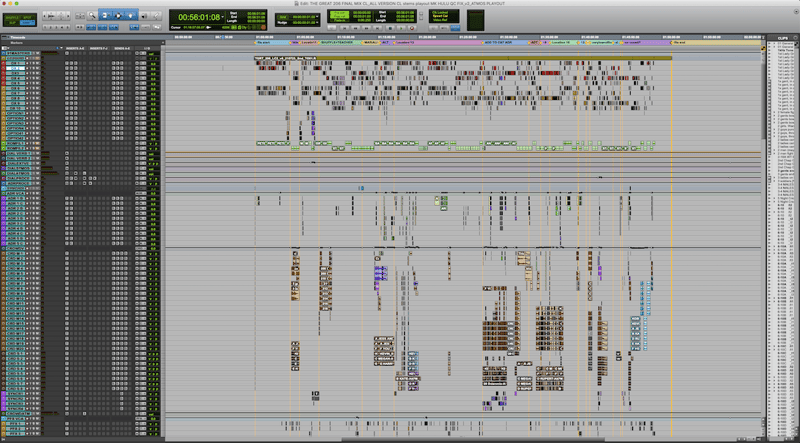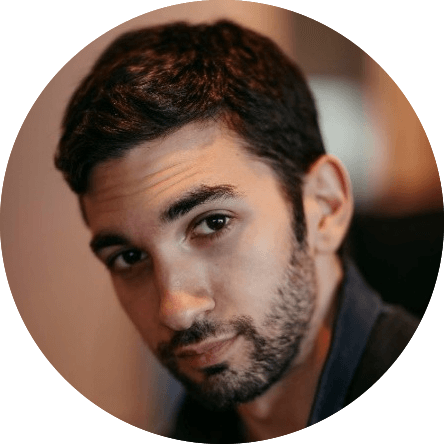How award-winning sound supervisor Joe Fletcher relies on Pro Sound Effects to streamline workflow for multiple projects and deliver amazing sound.
With content production accelerating exponentially between broadcast, OTT, and social platforms, while post production teams juggle simultaneous TV, feature film, advertising, and short-form projects, time is of the absolute essence for sound supervisors to work their magic. Each project that moves through the system carries a unique deadline, budget, resources, and approval chain. How can the sound supervisor keep so many trains on so many different tracks at full speed, without incident?
We connected with Joe Fletcher, an award-winner supervising sound editor from Company 3, based in the UK, to learn some of the secrets to his success.
Company 3 spun off from Deluxe and is now co-headquartered with Framestore, a London-based BAFTA and Oscar-winning effects house and post production facility. The studio, with additional locations in New York, Los Angeles, Atlanta, Canada (Toronto and Vancouver), and India (Pune). They boast an impressive TV client roster, taking on high end projects for all the UK domestic channels, such as BBC, ITV, Channel 4, Sky, as well as several hit series on Netflix (Feel Good, Us), Hulu (The Great), and Apple TV+ (The Morning Show).
Among many duties, it’s Joe’s job to know all of the post production resources at his disposal. Some audio elements will come directly from production sound, others by artists, and the rest will be created in-studio via ADR sessions and use of sound effects libraries. 
Vision and Planning
While countless hours will be spent perfecting the sound design in concert with each frame of the visual, before an edit is made, Joe and his team first like to zoom out and take in the Big Picture. What is the director’s vision for the project? The desired theme, tone and pace of the project will all impact the decisions the sound team makes down the line. He’ll ask, “Where and when is the story set?" versus “Where and when it is shot?” Beyond soundstage footage, quite often cities pass for other cities, and if the story is set in the past or future, the sonic experience might need to change dramatically.
Joe typically starts by looking at schedules and quotes to get an idea of the scale of the project and the time that he’ll ideally need in post. These decisions will influence how he sets up and schedules the team. Whenever possible, he reads the script to get an idea of locations as certain sounds might jump off the page that need to be thought through in greater detail.
"The desired theme, tone and pace of the project will all impact the decisions the sound team makes down the line."

Creativity and Authenticity
“When working on a feature film or a TV series, you never know what type of sound is going to be needed,” Joe says. Us, based on the novel by David Nicholls, sees its characters traveling across Europe. Before even hearing the production sound, Joe took comfort in knowing that his sound effects library from Pro Sound Effects had a wealth of expertly recorded city ambiences from all around Europe, ready to go at his beck and call. Alongside the unique architecture and culture of a city, comes a distinct audio soundtrack that varies by location and time of day (police, ambulance and fire sirens, crowd murmurs, passing river waters, air traffic and more). If a scene was shot in an alley in Salzburg but is set in Munich, sound artists can make the adjustment to please a discerning ear. In the example of Us, Joe explains, “We could hire a freelancer to go to Copenhagen and record trolleys rolling around, but then we would have to edit, master, and log all that stuff. With our PSE library, at the click of a button, it’s all there.”
Such needs, in fact, were what inspired Joe to upgrade Company 3’s libraries with PSE. “When I joined the company, we had a large library, but quite an old one in need of modernizing.” As post production houses like Company 3 grow, their sound effects libraries tend to be a piecemeal accumulation of sounds of varying quality and sources. Artists can use what they have or lay the foundation for guaranteed success by ensuring they start with the very best. “You can spend time editing, trying to get the best out of something only to get to the end of that and go, ‘no, this isn't good enough,’” Joe says, adding that he appreciates the quality of his PSE library to deliver what he needs, when he needs it.
According to Joe, it takes a massive pressure off the start of a project to know he won’t have to look piecemeal through different libraries or create original recordings when it's not feasible to do so. The Pro Sound Effects library alleviates worries about quality control; he knows the recording quality and specs are optimized for the highest end projects, so he can focus his energy on using the sounds creatively. “This has made a massive difference to my workflow now that such a wide catalog of sounds is available at my fingertips.”
With each new project, Joe discovers more and more within the universe of the PSE library. He has access not only to large general collections spanning 600+ categories of sound, but also a bevvy of hyper specialized, category-specific libraries - ensuring he’s covered even for the most unlikely needs.
“I've definitely used the Abandoned Hospital and Abandoned Prison libraries from Sonomar Collection: Abandoned a lot,” Joe said. “Those are great, especially for the police dramas that we have here in the UK. The Bass Machine library gave me really good inspiration for sound design elements in Feel Good. European Capitals has a lot of great crowd elements in there that always come in handy. And the massive scope and quality of the Odyssey Collection and King Collection give me a really solid backbone for everything else.” All are available in the CORE Pro Plus bundle that Company 3 has licensed for Joe and his team.
"With our PSE library, at the click of a button, it’s all there... This has made a massive difference to my workflow now that such a wide catalog of sounds is available at my fingertips."

Working with complex visual effects often means frequent sound mix changes, so having a good library with great quality recordings allows Joe and his team to make swift changes when new VFX comes in. Long before the final edit, Joe is often asked to put together a temp mix to create screeners for TV critics. Even though the SFX are placeholders, even the smallest details need to be broadcast quality, uphold the director’s vision, and not take the viewer out of the story. “There are times when we have done temp mixes and there isn't the time or the budget to have a full Foley pass. Situations like this are where I find my PSE library really supported me because I could go in and cut in specific Foley spots that I know you would miss not having there, even in a temp.”
Sometimes Joe is creative with his searches to find sounds that will fit the vision of the scene, other times, what he finds is exactly what he needs. “For some of the Paris recordings inside and outside the Louvre, the (library) metadata photo is almost the same as the video I'm working on. It’s so satisfying to know I’ve actually got a beautiful surround sound ambience of that interior lobby inside the Louvre and it sounds amazing.”
Quality and Value
Joe reveals that clients and directors can't always express what they don't like about a work in progress, and sometimes it’s just a sense that something is wrong. As a sound editor, he has to try and interpret what that problem is and what the right solution might be. “It definitely helps if you can say to a client in a spotting session, meeting, or in a review, ‘I'm putting in authentic recordings of exactly what you're seeing.’ They're comforted by that and you gain some trust with them.”
The quality of shows on streaming services has gone up so much that the standard for television sound almost matches that of a theatrical film. Viewers don't realize that the reason feature films sound the way that they do is the time and the budget they have to create bespoke recordings for everything the story needs. That's rarely possible with a TV budget and timeline.
"The standard across all disciplines on The Great was so high we had to deliver our very best work. We were able to do some bespoke recording sessions for the project, but Pro Sound Effects was an integral part of my workflow. It meant I had instant access to feature level quality sounds exactly when I needed them."
Thank you to Vinny Alfano and Keith Creighton for putting this article together.
Joe Fletcher is a film & television editor.
Follow Joe: LinkedIn | IMDb
Editor’s Note: Since publication of this post, Joe Fletcher has since left Company3.
How can Pro Sound Effects empower your creative organization?













